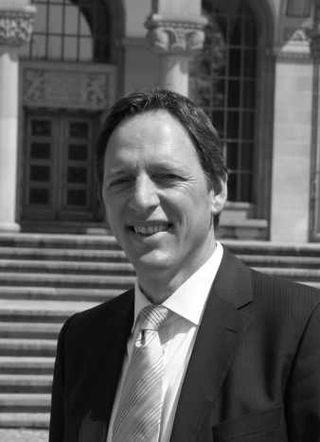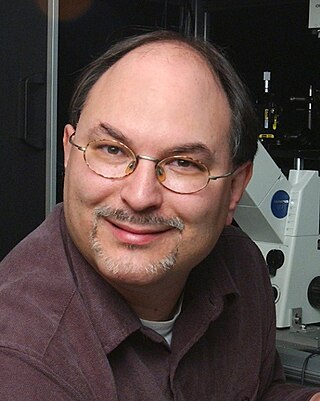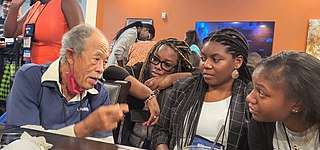Related Research Articles

Sir David William Cross MacMillan is a Scottish chemist and the James S. McDonnell Distinguished University Professor of Chemistry at Princeton University, where he was also the chair of the Department of Chemistry from 2010 to 2015. He shared the 2021 Nobel Prize in Chemistry with Benjamin List "for the development of asymmetric organocatalysis". MacMillan used his share of the $1.14 million prize to establish the May and Billy MacMillan Foundation.

Stefan Seeger is a German chemist and professor at the University of Zurich in Switzerland.
Gordon G. Hammes is a distinguished service professor of biochemistry, emeritus, at Duke University, professor emeritus at Cornell University, and member of United States National Academy of Sciences. Hammes' research involves the study of enzyme mechanisms and enzyme regulation.

John F. Hartwig is an American organometallic chemist who holds the position of Henry Rapoport Professor of Chemistry at the University of California, Berkeley. His laboratory traditionally focuses on developing transition metal-catalyzed reactions. Hartwig is known for helping develop the Buchwald–Hartwig amination, a chemical reaction used in organic chemistry for the synthesis of carbon–nitrogen bonds via the palladium-catalyzed cross-coupling of amines with aryl halides.
Heather Cecile Allen is a research chemist, who leads the Allen Group at Ohio State University. Allen's research focuses on interfacial phenomena, particularly those involving water and air. Her work has broad application ranging from medicine to climate change. She also develops nonlinear optical spectroscopy and microscopy instruments for the examination of interfacial surfaces.
Barbara J. Finlayson-Pitts is a Canadian-American atmospheric chemist. She is a professor in the chemistry department at the University of California, Irvine and is the Director of AirUCI Institute. Finlayson-Pitts and James N. Pitts, Jr. are the authors of Chemistry of the Upper and Lower Atmosphere: Theory, Experiments, and Applications (1999). She has been a member of the National Academy of Sciences since 2006 and is the laureate for the 2017 Garvan–Olin Medal. In 2016 she co-chaired the National Academy of Science report "The Future of Atmospheric Chemistry Research"

Nils G. Walter, Dr. Ing., is the Francis S. Collins Collegiate Professor of Chemistry, Biophysics, and Biological Chemistry at the University of Michigan, Ann Arbor. Research in the Nils Walter Lab focuses on non-coding RNA through the lens of single molecule techniques. He is the Founding Director of the Single Molecule Analysis in real-Time (SMART) Center at Michigan. In addition, Walter is the Founding Co-Director for the University of Michigan Center for RNA Biomedicine whose mission is to enrich the university’s intellectual and training environment around RNA Biomedicine. He is currently an Associate Director for the Michigan Post-baccalaureate Research Education Program (PREP).
Mahdi Muhammad Abu-Omar is a Palestinian-American chemist, currently the Duncan and Suzanne Mellichamp Professor of Green Chemistry in the Departments of Chemistry & Biochemistry and Chemical Engineering at University of California, Santa Barbara.
Jenny Yue-fon Yang is an American chemist. She is a Professor of chemistry at the University of California, Irvine where she leads a research group focused on inorganic chemistry, catalysis, and solar fuels.

Marcey Lynn Waters is the Glen H. Elder Jr., Distinguished Professor of Chemistry at the University of North Carolina, Chapel Hill (UNC-CH). She is an organic chemist whose research is at the interface of chemical biology and supramolecular chemistry. Waters has received multiple awards for research, teaching, and advocating for women in science. She served as president of the American Peptide Society (APS) from 2017 to 2019.

Vy Maria Dong is a Vietnamese-American Chancellor's Professor of Chemistry at the University of California, Irvine (UCI). Dong works on enantioselective catalysis and natural product synthesis. She received the Royal Society of Chemistry's Merck, Sharp & Dohme Award in 2020, the American Chemical Society's Elias James Corey Award in 2019, and the UCI's Distinguished Alumni Award in 2018.

William Morgan Jackson is a Distinguished Research and Emeritus Professor of Chemistry at University of California, Davis and pioneer in the field of astrochemistry. His work considers cometary astrochemistry and the development of laser photochemistry to understand planetary atmospheres. He is a Fellow of the American Association for the Advancement of Science, the American Physical Society and the American Chemical Society. In addition to contributing research work, he is notable as a mentor and advocate for increasing minority participation in science where he was a founders of the National Organization for the Professional Advancement of Black Chemists and Chemical Engineers (NOBCChE).
Vartkess Ara Apkarian is an Armenian-American physical chemist and a Professor of Chemistry at The University of California, Irvine.

Jayaraman Sivaguru (Siva) is the Antonia and Marshall Wilson Professor of Chemistry and the Associate Director, Center for Photochemical Sciences at the Department of Chemistry, Bowling Green State University, Bowling Green, Ohio. He is a recipient of 2008 National Science Foundation CAREER Award, 2010 Grammaticakis-Neumann Prize from the Swiss Chemical Society, 2011 young-investigator award from the Inter-American Photochemical Society (I-APS), and 2012-young investigator award from Sigma Xi. His honors also include Excellence in Research award, 2011 Excellence in Teaching award, and the 2012 PeltierAward for Innovation in Teaching. Prof. Siaguru was a visiting young professor at the Global Centre for Excellence at Osaka University, Japan and was a visiting fellow for the Chinese Academy of Sciences President's International Fellowship Initiative in 2018. He is an editor for the Journal of Photochemistry and Photobiology A: Chemistry and from 2020 serves as the co-Editor-in-Chief of Journal of Photochemistry and Photobiology published by Elsevier. He is an international board member of the International Union of Pure and Applied Chemistry (IUPAC) photochemistry symposium.
Gabriela S. Schlau-Cohen is a Thomas D. and Virginia W. Cabot Career Development Associate Professor at MIT in the Department of Chemistry.
Ellen Sletten is an American chemist who is the John McTague Career Development Chair at University of California, Los Angeles. Her research considers the use of physical organic chemistry for diagnostics and medical therapies.
Philipp Kukura FRSC is Professor of Chemistry at the University of Oxford, and a Fellow of Exeter College, Oxford. He is best known for pioneering contributions to femtosecond stimulated Raman spectroscopy (FSRS), interferometric scattering microscopy (iSCAT) and the development of mass photometry.
Jin-Quan Yu is a Chinese-born American chemist. He is the Frank and Bertha Hupp Professor of Chemistry at Scripps Research, where he also holds the Bristol Myers Squibb Endowed Chair in Chemistry. He is a 2016 recipient of the MacArthur Fellowship, and is a member of the American Academy of Arts and Sciences, American Association for the Advancement of Science, and the Royal Society of Chemistry. Yu is a leader in the development of C–H bond activation reactions in organic chemistry, and has reported many C–H activation reactions that could be applicable towards the synthesis of drug molecules and other biologically active compounds. He also co-founded Vividion Therapeutics in 2016 with fellow Scripps chemists Benjamin Cravatt and Phil Baran, and is a member of the scientific advisory board of Chemveda Life Sciences.
Christy F. Landes is an American physical chemist who is the Jerry A. Walker Endowed Chair in chemistry at the University of Illinois Urbana-Champaign. She previously was the Kenneth S. Pitzer-Schlumberger Chair at Rice University. She seeks to understand the structure-function relationships in biological processes and materials. She was appointed a National Academy of Sciences Kavli Fellow in 2019.
Jennifer Ann Prescher is an American chemist who is a professor of chemistry at the University of California, Irvine. Her research considers the development of bioorthogonal, bioluminescent tools for the noninvasive, real-time imaging of immunometabolism. She was recognized with the 2023 American Chemical Society Arthur C. Cope Scholar Award.
References
- 1 2 "ACS 2023 National Award winners". cen.acs.org. Retrieved 2022-10-31.
- ↑ Marino, J.P. (2000). "University of Michigan Chemistry Newsletter" (PDF). Retrieved 18 October 2018.
- 1 2 "Professor Blum". University of California, Irvine. Retrieved 2022-08-27.
- ↑ Hirner, Joshua J.; Shi, Yili; Blum, Suzanne A. (2011). "Organogold Reactivity with Palladium, Nickel, and Rhodium: Transmetalation, Cross-Coupling, and Dual Catalysis". Accounts of Chemical Research. 44 (8): 603–613. doi:10.1021/ar200055y. ISSN 0001-4842. PMID 21644576.
- ↑ Issaian, Adena; Tu, Kim N.; Blum, Suzanne A. (2017). "Boron–Heteroatom Addition Reactions via Borylative Heterocyclization: Oxyboration, Aminoboration, and Thioboration". Accounts of Chemical Research. 50 (10): 2598–2609. doi:10.1021/acs.accounts.7b00365. ISSN 0001-4842. PMID 28933550.
- ↑ Cordes, Thorben; Blum, Suzanne A. (2013). "Opportunities and challenges in single-molecule and single-particle fluorescence microscopy for mechanistic studies of chemical reactions". Nature Chemistry. 5 (12): 993–999. doi:10.1038/nchem.1800. ISSN 1755-4349. PMID 24256861.
- ↑ Hanada, Erin M.; Tagawa, Tristen Kazumasa Soriano; Kawada, Masamu; Blum, Suzanne A. (2022-07-13). "Reactivity Differences of Rieke Zinc Arise Primarily from Salts in the Supernatant, Not in the Solids". Journal of the American Chemical Society. 144 (27): 12081–12091. doi:10.1021/jacs.2c02471. ISSN 0002-7863. PMC 9970556 . PMID 35767838. S2CID 250146552.
- ↑ Eivgi, Or; Blum, Suzanne A. (2022). "Real-Time Polymer Viscosity–Catalytic Activity Relationships on the Microscale". Journal of the American Chemical Society. 144 (30): 13574–13585. doi:10.1021/jacs.2c03711. ISSN 0002-7863. PMID 35866383. S2CID 250954171.
- ↑ "10 faculty honored as AAAS fellows". UCI Provost and Executive Vice Chancellor. 2017-11-20. Retrieved 2022-08-27.
- ↑ "Prof. Dr. Suzanne Blum". www.humboldt-foundation.de. Retrieved 2022-11-08.
- ↑ "Suzanne Blum named JSPS fellow | UCI Department of Chemistry". www.chem.uci.edu. Retrieved 2022-11-08.